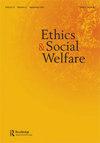Why Care for Others?: How Bill Wilson Made Responsibility to Care a Matter of Life and Death in Alcoholics Anonymous
IF 0.9
Q4 SOCIAL WORK
引用次数: 0
Abstract
ABSTRACT Joan Tronto’s new paradigm of caring democracy bases citizenship on the need to ensure that all people receive and provide care equitably. But how exactly are citizens motivated to take up these caring responsibilities? The writings of Alcoholics Anonymous (AA) co-founder William ‘Bill’ Wilson provide one answer: he pathologizes the alcoholic – dooming him to inevitable relapse and death – to compel AA members to accept shared vulnerability and mutual care as the bedrock of sobriety and AA society. Wilson returns repeatedly to the threat of death to convince AA members to carry out their newfound caring and democratic responsibilities. We use Wilson’s thinking, as well as Michel Foucault’s work on biopower, to forward the concept of biocaring democracy, in which the acceptance of shared pathology compels people to care for each other but also limits their democratic responsibilities. More broadly, our analysis suggests how hinging democracy to shared vulnerability may constrain the radical possibilities that Tronto envisions.为什么要关心别人?:比尔·威尔逊如何在匿名戒酒会中承担起关心生死的责任
琼·特朗托的关怀民主新范式将公民身份建立在确保所有人公平接受和提供关怀的必要性之上。但是,公民究竟是如何被激励去承担这些关怀责任的呢?匿名戒酒会(Alcoholics Anonymous, AA)联合创始人威廉·“比尔”·威尔逊(William ' Bill ' Wilson)的著作提供了一个答案:他把嗜酒者病态化——注定了他们不可避免的复吸和死亡——迫使匿名戒酒会成员接受共同的脆弱和相互关怀,这是戒酒和匿名戒酒会社会的基石。威尔逊反复以死亡相威胁来说服AA成员履行他们新发现的关怀和民主责任。我们利用威尔逊的思想,以及米歇尔·福柯(Michel Foucault)关于生物权力的研究,提出了生物关怀民主的概念,在这个概念中,对共同病理的接受迫使人们相互关心,但也限制了他们的民主责任。更广泛地说,我们的分析表明,将民主与共同的脆弱性挂钩,可能会限制特伦托设想的激进可能性。
本文章由计算机程序翻译,如有差异,请以英文原文为准。
求助全文
约1分钟内获得全文
求助全文
来源期刊

Ethics and Social Welfare
SOCIAL WORK-
CiteScore
1.60
自引率
20.00%
发文量
36
期刊介绍:
Ethics and Social Welfare publishes articles of a critical and reflective nature concerned with the ethical issues surrounding social welfare practice and policy. It has a particular focus on social work (including practice with individuals, families and small groups), social care, youth and community work and related professions. The aim of the journal is to encourage dialogue and debate across social, intercultural and international boundaries on the serious ethical issues relating to professional interventions into social life. Through this we hope to contribute towards deepening understandings and further ethical practice in the field of social welfare. The journal welcomes material in a variety of formats, including high quality peer-reviewed academic papers, reflections, debates and commentaries on policy and practice, book reviews and review articles. We actively encourage a diverse range of contributions from academic and field practitioners, voluntary workers, service users, carers and people bringing the perspectives of oppressed groups. Contributions might include reports on research studies on the influence of values and ethics in social welfare practice, education and organisational structures, theoretical papers discussing the evolution of social welfare values and ethics, linked to contemporary philosophical, social and ethical thought, accounts of ethical issues, problems and dilemmas in practice, and reflections on the ethics and values of policy and organisational development. The journal aims for the highest standards in its published material. All material submitted to the journal is subject to a process of assessment and evaluation through the Editors and through peer review.
 求助内容:
求助内容: 应助结果提醒方式:
应助结果提醒方式:


